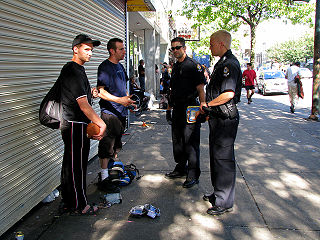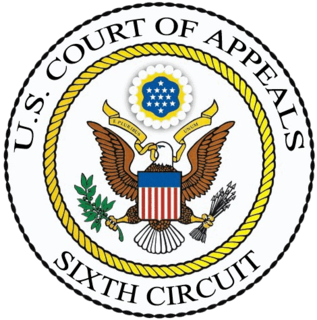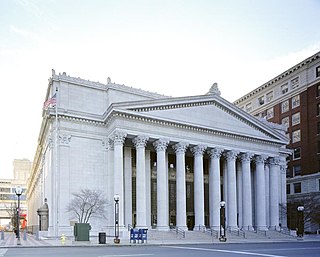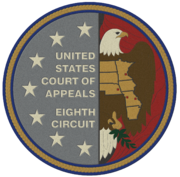
The Racketeer Influenced and Corrupt Organizations (RICO) Act is a United States federal law that provides for extended criminal penalties and a civil cause of action for acts performed as part of an ongoing criminal organization.

Theft is the taking of another person's property or services without that person's permission or consent with the intent to deprive the rightful owner of it. The word theft is also used as a synonym or informal shorthand term for some crimes against property, such as larceny, robbery, embezzlement, extortion, blackmail, or receiving stolen property. In some jurisdictions, theft is considered to be synonymous with larceny, while in others, theft is defined more narrowly. Someone who carries out an act of theft may be described as a thief.

In law, fraud is intentional deception to secure unfair or unlawful gain, or to deprive a victim of a legal right. Fraud can violate civil law or criminal law, or it may cause no loss of money, property, or legal right but still be an element of another civil or criminal wrong. The purpose of fraud may be monetary gain or other benefits, for example by obtaining a passport, travel document, or driver's license, or mortgage fraud, where the perpetrator may attempt to qualify for a mortgage by way of false statements.
Larceny is a crime involving the unlawful taking or theft of the personal property of another person or business. It was an offence under the common law of England and became an offence in jurisdictions which incorporated the common law of England into their own law, where in many cases it remains in force.

Identity theft occurs when someone uses another person's personal identifying information, like their name, identifying number, or credit card number, without their permission, to commit fraud or other crimes. The term identity theft was coined in 1964. Since that time, the definition of identity theft has been statutorily defined throughout both the U.K. and the United States as the theft of personally identifiable information. Identity theft deliberately uses someone else's identity as a method to gain financial advantages or obtain credit and other benefits, and perhaps to cause other person's disadvantages or loss. The person whose identity has been stolen may suffer adverse consequences, especially if they are falsely held responsible for the perpetrator's actions. Personally identifiable information generally includes a person's name, date of birth, social security number, driver's license number, bank account or credit card numbers, PINs, electronic signatures, fingerprints, passwords, or any other information that can be used to access a person's financial resources.
The Computer Fraud and Abuse Act of 1986 (CFAA) is a United States cybersecurity bill that was enacted in 1986 as an amendment to existing computer fraud law, which had been included in the Comprehensive Crime Control Act of 1984. The law prohibits accessing a computer without authorization, or in excess of authorization. Prior to computer-specific criminal laws, computer crimes were prosecuted as mail and wire fraud, but the applying law was often insufficient.
Bank fraud is the use of potentially illegal means to obtain money, assets, or other property owned or held by a financial institution, or to obtain money from depositors by fraudulently posing as a bank or other financial institution. In many instances, bank fraud is a criminal offence. While the specific elements of particular banking fraud laws vary depending on jurisdictions, the term bank fraud applies to actions that employ a scheme or artifice, as opposed to bank robbery or theft. For this reason, bank fraud is sometimes considered a white-collar crime.
Racketeering is a type of organized crime in which the perpetrators set up a coercive, fraudulent, extortionary, or otherwise illegal coordinated scheme or operation to repeatedly or consistently collect a profit.

Possession of stolen goods is a crime in which an individual has bought, been given, or acquired stolen goods.
Credit card fraud is an inclusive term for fraud committed using a payment card, such as a credit card or debit card. The purpose may be to obtain goods or services or to make payment to another account, which is controlled by a criminal. The Payment Card Industry Data Security Standard is the data security standard created to help financial institutions process card payments securely and reduce card fraud.

The Postville raid was a raid at the Agriprocessors, Inc. kosher slaughterhouse and meat packing plant in Postville, Iowa, on May 12, 2008, executed by the U.S. Immigration and Customs Enforcement (ICE) division of the Department of Homeland Security together with other agencies.

In the United States, a federal crime or federal offense is an act that is made illegal by U.S. federal legislation enacted by both the United States Senate and United States House of Representatives and signed into law by the president. Prosecution happens at both the federal and the state levels and so a "federal crime" is one that is prosecuted under federal criminal law and not under state criminal law under which most of the crimes committed in the United States are prosecuted.
Flores-Figueroa v. United States, 556 U.S. 646 (2009), was a decision by the Supreme Court of the United States, holding that the law enhancing the sentence for identity theft requires proof that an individual knew that the identity card or number he had used belonged to another, actual person. Simply using a Social Security Number is not sufficient connection to another individual.

Albert Gonzalez is an American computer hacker and computer criminal who is accused of masterminding the combined credit card theft and subsequent reselling of more than 170 million card and ATM numbers from 2005 to 2007: the biggest such fraud in history. Gonzalez and his accomplices used SQL injection to deploy backdoors on several corporate systems in order to launch packet sniffing attacks which allowed him to steal computer data from internal corporate networks.
Honest services fraud is a crime defined in 18 U.S.C. § 1346, added by the United States Congress in 1988, which states "For the purposes of this chapter, the term scheme or artifice to defraud includes a scheme or artifice to deprive another of the intangible right of honest services."

The Identity Theft Resource Center is a United States non-profit organization founded to provide victim assistance and consumer education through its toll-free call center, website and social media. The ITRC educates consumers, corporations, government agencies, and other organizations on best practices for fraud and identity theft detection, reduction and mitigation; and, serves as a relevant national resource on consumer issues related to cybersecurity, data breaches, social media, fraud, scams, and other issues. It was created in December 1999 in San Diego, California. The center also provides education programs to prevent privacy issues such as data breaches, scams, and fraud.
Operation Power Outage was a sting operation targeted at arresting and indicting members of the criminal group Armenian Power operating in the United States. The group is accused of racketeering offenses, bank fraud schemes, kidnappings, and drug trafficking. Armenian Power which originated 20 years ago in East Hollywood and has over 200 members, has developed from a street gang into an international criminal organization.

United States v. Warshak, 631 F.3d 266 is a criminal case decided by the United States Court of Appeals for the Sixth Circuit holding that government agents violated the defendant's Fourth Amendment rights by compelling his Internet service provider (ISP) to turn over his emails without first obtaining a search warrant based on probable cause. However, constitutional violation notwithstanding, the evidence obtained with these emails was admissible at trial because the government agents relied in good faith on the Stored Communications Act (SCA). The court further declared that the SCA is unconstitutional to the extent that it allows the government to obtain emails without a warrant.
Cyber crime, or computer crime, refers to any crime that involves a computer and a network. The computer may have been used in the commission of a crime, or it may be the target. Netcrime refers, more precisely, to criminal exploitation of the Internet. Issues surrounding this type of crime have become high-profile, particularly those surrounding hacking, copyright infringement, identity theft, child pornography, and child grooming. There are also problems of privacy when confidential information is lost or intercepted, lawfully or otherwise.

United States v. Ivanov was an American court case addressing subject-matter jurisdiction for computer crimes performed by Internet users outside of the United States against American businesses and infrastructure. In trial court, Aleksey Vladimirovich Ivanov of Chelyabinsk, Russia was indicted for conspiracy, computer fraud, extortion, and possession of illegal access devices; all crimes committed against the Online Information Bureau (OIB) whose business and infrastructure were based in Vernon, Connecticut.











